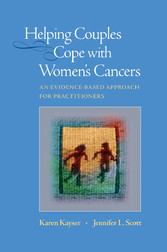Suchen und Finden
Helping Couples Cope with Women's Cancers - An Evidence-Based Approach for Practitioners
Mehr zum Inhalt

Helping Couples Cope with Women's Cancers - An Evidence-Based Approach for Practitioners
Kayser and Scott have written an excellent manual for mental health practitioners who care for women with cancer. To provide the best treatment for women and couples living with cancer, it is imperative for the therapist to have a thorough understanding of medical treatments as well as normal responses to the experience. Readers of this well-written, thoughtful, and practical book will have both.' -Hester Hill Schnipper, LICSW, BCD, OSW-C, Chief, Oncology Social Work, BIDMC, Author, After Breast Cancer: A Commonsense Guide to Life After Treatment
Close relationships can be vital to a woman’s recovery from breast or gynecological cancer and the myriad stressors that accompany diagnosis and treatment. Helping Couples Cope with Women’s Cancer shows readers not only how to enlist the patient’s closest support person in coping with the disease, but also to help that partner with the stressors, such as feelings of inadequacy and loss, that so often come with the role.
The authors, established experts on their subject, recognize the challenges couples face, the central role of communication in coping, and the individuality of each patient and couple. In addition to proven intervention techniques and helpful assessment tools, the book features case illustrations, 'What to do if…' sections, sociocultural considerations, and suggestions for when the patient’s caregiver is not her partner. Key areas of coverage include:
Assessment: quality of life, impact of illness, family resources.
Balancing work, family, self-care, and the demands of illness.
Cognitive coping, relaxation, stress reduction.
Body image, sexuality, and intimacy.
Helping children cope: developmental guidelines.
Transitions: goal-setting, life after cancer, facing recurrence or terminalillness.
The skills and insights contained in Helping Couples Cope with Women’s Cancers will benefit a range of health and mental health practitioners, including counselors, social workers, clinical psychologists, psychiatrists, and nurses. Graduate students planning a career in health psychology or couples therapy should also find it a valuable resource.
Alle Preise verstehen sich inklusive der gesetzlichen MwSt.







